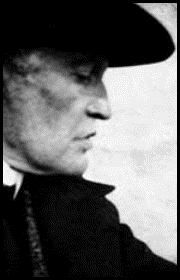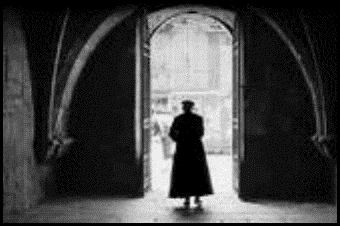
At the beginning he spoke without realizing what he wassaying. He wasn't even listening to himself. He hardly heard theclear and fluent melody which flowed from a spring dormant inhis soul ever since the beginning of the world. He had the confused certainty that his words were flowing forth precisely,opportunely, exactly, in the expected order and place. He felt awarm vapor pressing his innards. But he also knew that his spiritwas free of vanity, and that the feeling of pleasure which paralyzed his senses was not pride or defiance or vanity but, rather,the pure rejoicing of his spirit in Our Lord.
In her bedroom, Rebecca felt faint, knowing that within afew moments the heat would become impossible. If she had notfelt rooted to the town by a dark fear of novelty, she would haveput her odds and ends in a trunk with mothballs and would havegone off into the world, as her great-grandfather did, so she hadbeen told. But she knew inside that she was destined to die inthe town, amid those endless corridors and the nine bedrooms,whose screens she thought she would have replaced by translucent glass when the heat stopped. So she would stay there, shedecided (and that was a decision she always took when shearranged her clothes in the closet), and she also decided to write"My Eminent Cousin" to send them a young priest, so she couldattend church again with her hat with the tiny velvet flowers,and hear a coherent Mass and sensible and edifying sermons again. Tomorrow is Monday, she thought, beginning to thinkonce and for all about the salutation of the letter to the Bishop(a salutation which colonel Buendra had called frivolous anddisrespectful), when Argenida suddenly opened the screeneddoor and shouted:
"Señora, people are saying that the Father has gone crazy inthe pulpit!"
The widow turned a not characteristically withered and bitter face toward the door. "He's been crazy for at least five years,"she said. And she kept on arranging her clothing, saying:
"He must have seen the devil again."
"It's not the devil this time," said Argenida.
"Then who?" Rebecca asked, prim and indifferent."Now he says that he saw the Wandering Jew."
The widow felt her skin crawl. A multitude of confusedideas, among which she could not distinguish her torn screens,the heat, the dead birds, and the plague, passed through herhead as she heard those words which she hadn't rememberedsince the afternoons of her distant girlhood: "The wanderingJew." And then she began to move, enraged, icily, toward whereArgenida was watching her with her mouth open."It's true," Rebecca said in a voice which rose from thedepths of her being. 'Now I understand why the birds are dyingoff."
Impelled by terror, she covered herself with a black embroidered shawl and, in a flash, crossed the long corridor and theliving room stuffed with decorative objects, and the street door,and the two blocks to the church, where Father Anthony Isabelof the Holy Sacrament of the Altar, transfigured, was saying, "Iswear to you that I saw him. I swear to you that he crossed mypath this morning when I was coming back from administeringthe holy unction to the wife of Jonas the carpenter. I swear to you that his face was blackened with the malediction of theLord, and that he left a track of burning embers in his wake."

He saw that there were people in the church, and thatRebecca, pathetic, showy, her arms open, and her bitter, coldface turned toward the heavens, was advancing up the centralnave. Confusedly he understood what was happening, and heeven had enough lucidity to understand that it would have beenvanity to believe that he was witnessing a miracle. Humbly herested his trembling hands on the wooden edge of the pulpitand resumed his speech.
"Then he walked toward me," he said. And this time heheard his own voice, convincing, impassioned. "He walkedtoward me and he had emerald eyes, and shaggy hair, and thesmell of a billy goat. And I raised my hand to reproach him inthe name of Our Lord, and I said to him: 'Halt, Sunday hasnever been a good day for sacrificing a lamb.'"
When he finished, the heat had set in. That intense, solid,burning heat of that unforgettable August. But Father AnthonyIsabel was no longer aware of the heat. He knew that there, athis back, the town was again humbled, speechless with his sermon, but he wasn't even pleased by that. He wasn't even pleasedwith the immediate prospect that the wine would relieve hisravaged throat. He felt uncomfortable and out of place. He feltdistracted and he could not concentrate on the supreme momentof the sacrifice. The same thing had been happening to him for some time, but now it was a different distraction, because histhoughts were filled by a definite uneasiness. Then, for the firsttime in his life, he knew pride. And just as he had imagined anddefined it in his sermons, he felt that pride was an urge the sameas thirst. He closed the tabernacle energetically and said:
"Pythagoras."
The acolyte, a child with a shaven and shiny head, godsonof Father Anthony Isabel, who had named him, approached thealtar.
"Take up the offering," said the priest.
The child blinked, turned completely around, and then saidin an almost inaudible voice, "I don't know where the plate is."
It was true. It had been months since an offering had beencollected.
"Then go find a big bag in the sacristy and collect as muchas you can," said the Father.
*And what shall I say?" said the boy.
The Father thoughtfully contemplated his shaven blue skull,with its prominent sutures. Now it was he who blinked:
"Say that it is to expel the wandering Jew," he said, and hefelt as he said it that he was supporting a great weight in hisheart. For a moment he heard nothing but the guttering of thecandles in the silent temple and his own excited and laboredbreathing. Then, putting his hand on the acolyte's shoulder,while the acolyte looked at him with his round eyes aghast, hesaid:
"Then take the money and give it to the boy who was aloneat the beginning, and you tell him that it's from the priest, andthat he should buy a new hat."
Gabriel García Márquez
Gregory Rabassa, Translator
©1991 Harper Perenniel